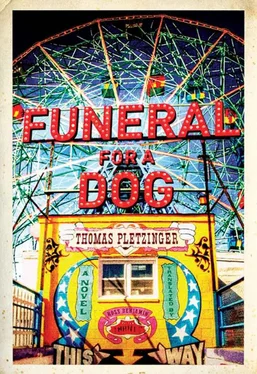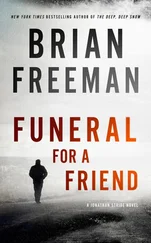(Lua leaves)
Suddenly wide awake: I’m standing barefoot in front of Svensson’s desk, the fresh imprint of Tuuli’s lips on mine, the warmth of the vodka in my belly. As it does every day at this time, the smell of something burning hangs in the air, over the lake lies the stone smoke (Claasen is torching again). I can hear the two women’s voices in the kitchen, then footsteps on the stairs. Tuuli Kovero, I think, because Tuuli’s last name has eluded me until now. Kiki Kaufman knocks on the door of Svensson’s study, comes in, a cardboard box in her hand and a small child on her hip: Hi, I’m Kiki. Daniel Mandelkern, I say. The two of them seem not the least bit surprised. And this is Bella, says Kiki Kaufman, say hello to Daniel, but the child only looks at me motionlessly and sucks on an orange pacifier (younger than Samy, maybe one and a half, dark curls and eyes). Kiki Kaufman is a tall woman with huge eyes, which beam despite their darkness. She’s wearing a red dress and yellow flip-flops, I notice her freckles and the gray strands in her hair, the paint on her strong fingers. Switching to German, she says that it’s nice to meet me, Svensson already told her about me on the phone yesterday (Bar del Porto). It’s good to have visitors, Bella should see other people now and then besides just father and mother and dog (he told me you’re feeling better, she says in English, are you?). Bella has the same large eyes as her mother, she has her warmhearted mouth, she has Svensson’s broad nose. I’m taken aback as I stand opposite her and the girl, I imagined her differently while reading Astroland , thinner and more reserved. Downstairs in the kitchen Tuuli is busy with kitchen things (the taste of her lips). Kiki hands me the box and puts the girl down on the floor of the study. Bella strolls through the room, she rattles the airplane mobile still hanging from the ceiling (Mandelkern can’t tell children’s toys from dog toys, incredible!). She and Bella have just returned from Rome, her first exhibition in Italy, a group show, but still ( quattro , she says, then in English: all pictures of the dog, how fitting, he’s so sick). Bella has come to the bookshelves, she laughs, her little teeth shine. Kiki follows her daughter, she briefly runs her finger over the boards, she straightens one of the pictures ( gut, gut , she says). She’s sorry that I have to stay in this empty and dreary room, Svensson and she are currently renovating this house. I must have already noticed the preparations for renovation. This room first, the books in the shed, the junk out of here, the chairs and loungers, the things left by Blaumeiser’s family. Did I need anything, something to drink maybe, I should make myself completely at home. Yes, I say. Kiki jumps between her languages, she falls from one into the other ( und so weiter and so forth). Without books, she says, the room immediately looks much drearier and bigger, but now it can be turned into something completely new. Apparently someone has already begun beautifying the room. Have you been drawing here, Daniel? Kiki laughs (I thought of Svensson as lonely). Would I agree with her that the view from this window is gorgeous, she loves sitting here in the morning (the American ease with which she uses the word Liebe ). The lizards, the wasps, the swallows. She talks and laughs, I nod. Finally she takes the box and removes the tape, she pulls out a PowerBook, styrofoam and plastic she throws back in the box. The old computer was so old, she says, after a while you couldn’t read a word, and when it came to photoshopping, it froze every time I started to work, so I threw it out. I’m glad to be back for the party, she then says, looking at me. You’re not much of a talker, Daniel, she says, switching back to English, are you? I’m just somewhat surprised, I say, sorry. She asks why exactly I’m here. I’m a journalist. My superior sent me, I say, but Kiki doesn’t understand the German word, so I speak English: My wife is my boss, I explain to her and myself, and as I hear myself speaking, I think that that’s precisely what could change. I blundered into this situation, I say, I was supposed to conduct an interview in a café in Lugano, but then I suddenly found myself on the boat, and now I’m still sitting here. My wife wants a profile for the newspaper, I say, but only a tiny bit of what I’ve learned so far is usable, a lot of it isn’t suited to a newspaper article, which can only feel its way along the surface. Kiki lifts up Bella again, the child squeals, the two of them laugh. We’re barely gone for a few days, she says, and Svensson invites over his listeners. Kiki is standing by the door holding the box and the child, Bella throws her pacifier on the floor. I pick it up. Do you have kids, Daniel? asks Kiki, looking at me. Not yet, I say.
the ethnological phenomenon of the informant switch
I’ve misjudged the weather conditions. As Tuuli’s imprint on me slowly disappears and the smoke disperses, I sit down at the desk, my feet on Svensson’s suitcase. My wedding ring is still lying on the two black folders. I’ve gotten into a situation that I wasn’t expecting. I didn’t resist (vodka and the possibility of another life). Nonetheless, everything remains as always: the pigeon droppings, and the swallows are flying again, higher than they were earlier this morning. I hear the rubberized closing of the refrigerator door, Bella’s squealing, the two women’s English. Svensson has gone to the village with the boy and the dog. I’m an ethnologist and literary scholar, I’ve learned to distinguish between text and life (I’ve forgotten what I learned). I should write that I don’t know these people, but I’ve stumbled into Svensson’s manuscript, I’ve kissed one of his characters and have just shook another one’s hand. From the kitchen Bella’s noise and the smell of onions in butter (ethnology increasingly differentiates itself from neighboring disciplines through the method of participant observation rather than through its focus on the so-called “culturally alien” as its object of investigation, Spittler 2001, if I remember correctly). I wonder:
— Have I lost scientific distance toward the object of the investigation?
— What does all this have to do with me?
the limits of the text
What is not in Svensson’s manuscript: whether Svensson and Kiki ever reached Montauk. What drove them back to Europe. When they decided to step out of time. How old Lua is. Whether Svensson has stepped out of time at all. Felix Blaumeiser is dead, I’ve been able to find that out, but not where he’s buried. Why Tuuli works in Berlin but was sitting, of all places, in my airport bus at the Hamburg Airport, why our journeys then led to the same destination (her lips on mine, my lips on hers).
onions in butter
Elisabeth’s and my honeymoon ended in a Polish hotel in the Kolberg (Kołobrzeg) Old City, the rooms in the back facing the courtyard, below the bedroom window a single sheep. The town house that had belonged to Elisabeth’s grandparents was on the other side of the street, in the garden hung a Polish flag on a rickety pole. The plaster was flaking off the walls, the old windows had been replaced by thermal panes in plastic frames, behind a curtain in a small bay window stood a child, observing us. This is where they lived, said Elisabeth, number 17, in the back of the house was my grandfather’s practice. Elisabeth and I walked up and down the bank of the Persante (Parseta), we ate dinner at an inn, herring in oil, potatoes and beer. We could have lived here, I said, if it hadn’t been for the war, for example, if not for this and if not for that, and Elisabeth smiled and kissed me. That, she declared, is nonsense, though charming. You couldn’t escape the past, that was obvious, but we shouldn’t forget the future on account of that. Crossroads were crossroads, and decisions were decisions, Elisabeth took my hand: she had decided on me and on now. After the third beer she kissed me again and longer (the taste of onions in butter). The Poles at the bar saw in us nostalgia tourists of the third generation, not honeymooners, the food was mediocre, and the men’s eyes were hostile, they hadn’t reckoned with Elisabeth’s beauty. The next morning she rolled up the red wedding dress, we brushed our teeth, the water tasted like metal. Heading back westward, we drove over cobblestones, across the border of the voivodeship, later through the tree-lined streets of Mecklenburg, we picked apples and bought cider in plastic bottles on the roadside. As we rolled onto the Priwall ferry, Elisabeth took her phone out of the glove compartment, turned it on and declared our future open (that’s how she expressed herself). Now I’m sitting in Svensson’s house at Svensson’s desk, but nonetheless hear Elisabeth bustling about in the kitchen, the sound of uncorked red wine bottles in our possible kitchens in Hamburg, Kolberg or Saint-Malo, in Venasque or Sausset-les-Pins, in New York as far as I’m concerned, maybe Lugano, in one of our possible lives. I hear the sound of my name from her mouth (Daniel Daniel), her precise, earnest laughter, I see her hair and her scars, the light skin of her body, easy to imagine as the body of a mother, her thin and nonetheless strong arms, her hair pulled back, Elisabeth always ties and pins her hair off her neck, the vein on her forehead, now her lips on mine (our bodies did fit after all), and from the kitchen a woman calls my name,
Читать дальше












